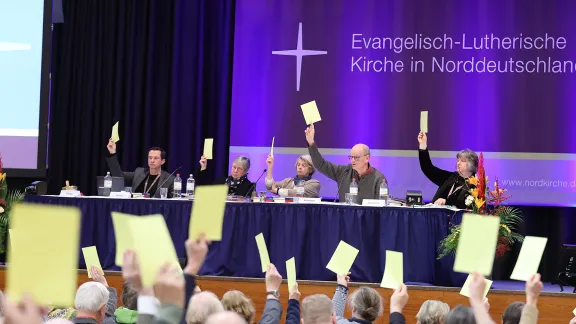From 2025 the synod of the Evangelical Lutheran Church in Northern Germany will be composed of equal numbers of men and women and ten percent of people aged 27 and younger.

Voting during the synod meeting of the Evangelical Lutheran Church in Northern Germany. Photo: Nordkirche, Susanne Hübner
Parity for women and men, ten percent young people
(LWI) – The Evangelical Lutheran Church in Northern Germany (Nordkirche) has established a policy and a voting system to ensure gender parity and youth participation in the church’s synod, its highest governing body.
In the meeting from 23-25 February, the synod members decided on binding gender parity and a compulsory quota for young members. In the future, at least one of every ten members of the church synod will be between 18 and 27 years of age.
“I am proud that the synod has unanimously taken this step,” said Synod President Ulrike Hillmann, adding that this should not be taken for granted. “Many institutions, companies and organizations have not yet realized gender equality and, thus, equal opportunities.”
“It is a genuinely Christian mandate to promote the gender equality of underrepresented groups or persons to achieve the most just possible participation and involvement of all its members in forming the church’s will,” the church leadership states.
Currently, the synod (156 seats) comprises 55 percent men and 43 percent women, with three vacant seats. The new election law will be implemented for the first time in 2024 when the next synod is elected.
A commitment to ensuring equality
The new electoral law also aims to ensure equal numbers of men and women on committees. Therefore, the aim is to have as many women as men stand for election. The same applies when appointing members to existing committees: attention must be paid to balancing gender representation.
“To produce an election result in compliance with parity principles in the sense of equality of results, the principles of a free and equal election shall be secondary and favor the church’s interest in actively promoting previously disadvantaged groups,” the church leadership’s proposal to this decision states.
In practice, the same number of women as men will have to stand for election. When votes are counted, the person who has obtained the highest number of votes on the respective lists for men and women would be alternatingly regarded as elected in each case.
“The decision taken by the Nordkirche is a strong witness of our member church’s commitment to gender justice and intergenerational justice as an act of faith,” said Rev. Dr. Marcia Blasi, LWF’s Program Executive for Gender Justice and Women’s Empowerment at The Lutheran World Federation (LWF). “And it comes in the year in which we celebrate ten years of the approval of the LWF Gender Justice Policy.”


